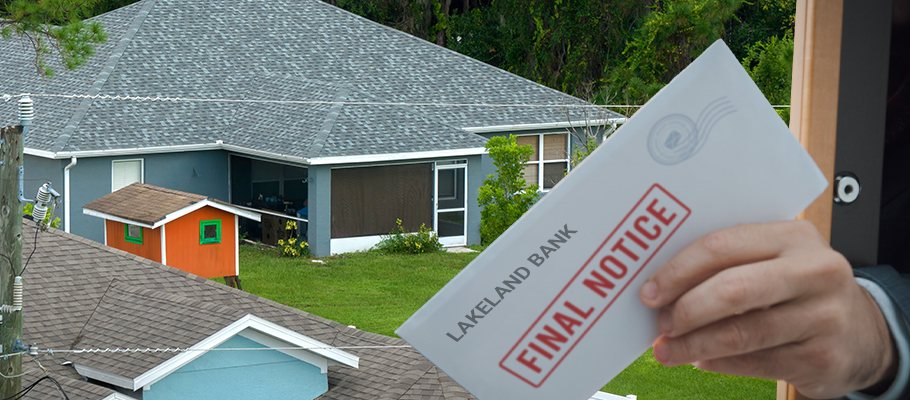
At Lincoln Madison Investments, our mission is to provide homeowners with a fast and fair home-selling solution, even when they’re facing foreclosure, to help them avoid losing their homes and damaging their credit. We understand that facing the possibility of foreclosure can be an incredibly stressful and emotionally challenging experience, and we are committed to helping homeowners in Lakeland, Winter Haven, Poinciana, Davenport, and throughout Polk County navigate this difficult time with support, guidance, and expertise. If you find yourself facing foreclosure in Florida, it’s crucial to understand the foreclosure process and your rights as a homeowner.
Understanding the Florida Foreclosure Process
Florida is a judicial foreclosure state, which means that the lender must file a lawsuit in court to foreclose on your property. This process can be lengthy and complex, but understanding the key foreclosure steps in Florida can help you better prepare for what lies ahead.
Foreclosure Steps in Florida:
Step 1: Pre-foreclosure
If you fall behind on your mortgage payments, your lender will send you a breach letter notifying you of the default and giving you a specified period, typically 30 days, to catch up on your payments. This is known as the pre-foreclosure stage and is an important time to explore your options and communicate with your lender.
Step 2: Foreclosure complaint
If you are unable to bring your mortgage current within the allotted time, your lender will proceed with filing a foreclosure complaint (lawsuit) with the court. You will then be served with a summons and complaint, officially notifying you of the legal action against you.
Step 3: Foreclosure Response
Upon being served, you have 20 days to file a response to the complaint. This is your opportunity to contest the foreclosure, raise defenses, or seek legal counsel. If you fail to respond within the given timeframe, the lender can obtain a default judgment against you, accelerating the foreclosure process.
Step 4: Foreclosure mediation
In some cases, the court may require mediation as a way to explore alternatives to foreclosure and facilitate communication between you and your lender. Mediation can be an opportunity to discuss options such as loan modifications, short sales, or other loss mitigation strategies.
Step 5: Foreclosure Notice of sale
If the lender prevails in the lawsuit or you fail to reach an agreement through mediation, the court will enter a final judgment of foreclosure and schedule a sale date for your property. A notice of sale must be published in a local newspaper for two consecutive weeks leading up to the auction date.
Step 6: Foreclosure Sale
On the scheduled date, your property will be sold at a public auction to the highest bidder, which is often the lender itself. If a third party purchases the property, they must provide the funds at the time of sale.
Step 7: After the Foreclosure Sale
If the property sells for less than the total amount owed on your mortgage, the lender may seek a deficiency judgment against you, holding you responsible for the remaining balance. Following the sale, you will typically have 30 days to vacate the property, although this timeframe can vary depending on the circumstances.
Throughout the Florida foreclosure process, it’s essential to stay informed about your rights and actively explore your options for avoiding or delaying foreclosure.
How Long Does The Foreclosure Process Take in Florida?
The answer can vary depending on numerous factors, such as the complexity of your case, the court’s caseload, and the lender’s practices. On average, the foreclosure process in Florida can take several months to over a year from start to finish.
Here’s a general timeline of what you can expect once you begin missing mortgage payments:
- Pre-foreclosure: 3-6 months after your first missed payment.
- Foreclosure proceedings: 6-12 months from the filing of the foreclosure complaint to the foreclosure sale.
- Eviction after sale: 30 days or more following the foreclosure auction.
It’s important to note that this is a general timeline, and the actual duration of the foreclosure process in Florida can vary significantly from case to case. Some homeowners may find themselves in pre-foreclosure for longer periods, while others may experience a faster progression to the foreclosure sale. Factors such as seeking legal counsel, contesting the foreclosure, or engaging in loss mitigation efforts can also impact the overall timeline.
What Are My Rights and Options During Foreclosure?
As a Florida homeowner facing foreclosure, it’s crucial to understand that you have certain rights and options throughout the process. While it may feel like the situation is out of your control, being proactive and exploring these options can help you better protect your interests and potentially avoid or delay foreclosure.
Reinstating Your Mortgage or loan in Florida
In Florida, you have the right to reinstate your mortgage by paying the total past-due amount, including fees and costs, at any time before the final judgment of foreclosure is entered. This can be a viable option if you have the financial means to catch up on your payments and want to keep your home.
Redeeming the Property Before the Foreclosure Sale
Unlike some states, Florida does not provide a post-sale redemption period. However, you can effectively “redeem” the property by paying off the entire loan balance before the foreclosure sale takes place. While this may not be feasible for many homeowners, it’s important to understand your rights in this regard.
Loss Mitigation Options for Florida Homeowners
Engaging in loss mitigation efforts with your lender can be a powerful way to avoid foreclosure and find a more manageable solution. Options such as loan modifications, forbearance agreements, or short sales can help you resolve your mortgage default and potentially keep your home or minimize the financial impact of foreclosure.
Filing Bankruptcy Before Foreclosure
In some cases, filing for bankruptcy can provide a temporary reprieve from the foreclosure process and may allow you to catch up on missed payments or negotiate a more favorable outcome with your lender. However, it’s essential to consult with a qualified bankruptcy attorney to determine if this option is right for your specific situation.
The key to successfully navigating foreclosure is to explore these options as early as possible in the process. The sooner you take action, the more likely you are to find a workable solution and minimize the potentially devastating consequences of foreclosure.
How many missed payments before foreclosure in Florida?
In Florida, most lenders will initiate the foreclosure process after 90 days (3 months) of missed mortgage payments. However, this timeframe can vary depending on the specific terms of your loan agreement and your lender’s practices. Some lenders may be more lenient and allow for a more extended period of delinquency before moving forward with foreclosure.
It’s crucial to communicate with your lender as soon as you anticipate difficulty making your mortgage payments. The earlier you reach out, the more likely you are to find a mutually beneficial solution and avoid the stress and uncertainty of the foreclosure process.
Can you sell a property before foreclosure in Florida?
Yes, selling your home before foreclosure is an option available to Florida homeowners. In fact, selling a foreclosed home can be one of the most effective ways to avoid the negative consequences of foreclosure, such as long-term damage to your credit score and the possibility of a deficiency judgment.
By selling your home before foreclosure, you can take control of the situation, potentially minimize your financial losses, and move forward with a clean slate. However, it’s essential to act quickly and work with experienced professionals who can guide you through the process and help you maximize the value of your home.
Can a foreclosure be reversed in Florida?
In most cases, a completed foreclosure sale cannot be reversed or undone in Florida. Once the sale has taken place and the property has been transferred to a new owner, it can be extremely difficult, if not impossible, to regain ownership of your home.
However, you may be able to stop or delay the Florida foreclosure process before the sale takes place by taking proactive steps such as reinstating your loan, seeking loss mitigation options, or filing for bankruptcy. The key is to explore these options as early as possible and seek the guidance of qualified professionals who can help you understand your rights and make informed decisions.
How long do you have to move out after foreclosure in Florida?
After a foreclosure sale in Florida, you typically have 30 days to vacate the property and find alternative living arrangements. This timeframe is often referred to as the “move-out period” and is designed to give the former homeowner time to transition to a new residence.
If you do not vacate the property within the allotted 30 days, the new owner (often the lender) can initiate eviction proceedings to legally remove you from the premises. Eviction can be a stressful and traumatic experience, so it’s important to plan ahead and make necessary arrangements to ensure a smoother transition.
Do I still have to pay rent if the house is in foreclosure in Florida?
If you are a tenant living in a property that is going through foreclosure, you may be wondering about your rights and obligations regarding rent payments. In general, you must continue to pay rent to the current owner until the foreclosure process is completed and ownership of the property is officially transferred.
After the foreclosure sale, the new owner (often the lender) is required to provide you with a 30-day notice to vacate the property. During this time, you may be able to negotiate with the new owner regarding your tenancy and potential rent payments, depending on your specific circumstances and the new owner’s intentions for the property.
What is the redemption period for foreclosures in Florida?
Florida does not offer a post-sale redemption period as some other states do. However, homeowners have the option to “redeem” their property by paying off the entire loan balance before the foreclosure sale occurs.
Sell your home before foreclosure with Lincoln Madison Investments
If you need to sell a house in foreclosure in Lakeland, Winter Haven, Lake Wales, Davenport, or anywhere in Polk County, Florida, Lincoln Madison Investments is here to help. Our mission is to help you get a home cash offer, even when you’re facing foreclosure, to help you avoid losing your home and damaging your credit.
Don’t let the stress and uncertainty of the foreclosure process overwhelm you. Visit our website to contact us for a free cash offer or call us at 863-521-0549. We’ll work with you to find a solution that protects your financial future and helps you move forward with peace of mind.




